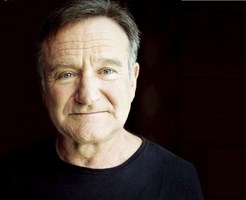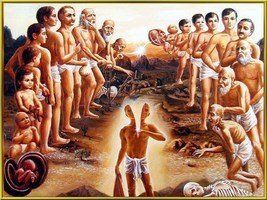I’m not afraid of dying. I don’t know how it’ll feel at the moment, but I’m prepared for death because I don’t believe in it. I think it’s just getting out of one car and getting into another. ~ John Lennon
 It has been several weeks since the world was shocked by the news of Robin Williams’ suicide, and the impact is still reverberating in me and many others, as we have such a hard time understanding why a man of Williams’ stature would take such an extreme measure. Then news this weekend of another public figure’s suicide—this one the hanging death of girl group singer Simone Battle—along with the death of an acquaintance of mine, of which I learned about via Facebook, it brought to light a number of factors I believe are worth discussing.
It has been several weeks since the world was shocked by the news of Robin Williams’ suicide, and the impact is still reverberating in me and many others, as we have such a hard time understanding why a man of Williams’ stature would take such an extreme measure. Then news this weekend of another public figure’s suicide—this one the hanging death of girl group singer Simone Battle—along with the death of an acquaintance of mine, of which I learned about via Facebook, it brought to light a number of factors I believe are worth discussing.
I was asked to “reach out” to the public regarding the subject of depression following Williams’ death, although I think that the decision to take one’s life goes well beyond that. It might be too easy to transfer our own perceptions on the one making the decision to end one’s life, as if we know or presume we can understand, or relate to, the origins of the psychological battle. And then by using these misperceptions we presume that we can then stop others from making the decision in the future. I think the notion is both false and a dishonoring of the free will of individuals. To assume that a person who makes such a decision is necessarily acting irrationally or irresponsibly is to impose one’s own morals onto another human being. And I think that those who take the most self righteous position regarding suicide have not yet felt the degree of pain and hopelessness that one must feel, to do what is likely the most difficult and counter-instinctive act any living being could carry out.
 I have heard it said that we all have a death wish at times—that is, the feeling that perhaps it would be better if we were just dead; to end the misery that we all face at one time or another. However, we also all have a life wish—that sense that life is the greatest gift we could ever have bestowed upon us. Both are one-sided illusions. The belief that we are born and we die, while ubiquitous and persistent, has no real truth outside of what happens to our material bodies. Science cannot unequivocally prove it, and spiritual teachers throughout the ages have insisted on it not being so, and they have rather compelling arguments to back up their claims. True, via our material senses, all we can surmise is a singular and solitary life cycle, but I would not bank everything on this idea, simply because our limited minds in their limited consciousness can only perceive one “reality” today. And even if it turns out to be the one reality, who is to say for anyone else whether that person’s life is worth living? We can only take such a moral position if we believe that life is the end-all-be-all, a position usually grounded in some antiquated religious belief or another. From a spiritual standpoint it makes no sense for a number of reasons (which is an article unto itself, so I won’t go into it here), and from a secular standpoint it really makes no sense. Yet that things will be better, easier, or simply ended by death is no less an illusion. From a philosophical standpoint there is no difference between life and death to the true Self. Only the Self alone exists, and it is eternal—all else is illusion.
I have heard it said that we all have a death wish at times—that is, the feeling that perhaps it would be better if we were just dead; to end the misery that we all face at one time or another. However, we also all have a life wish—that sense that life is the greatest gift we could ever have bestowed upon us. Both are one-sided illusions. The belief that we are born and we die, while ubiquitous and persistent, has no real truth outside of what happens to our material bodies. Science cannot unequivocally prove it, and spiritual teachers throughout the ages have insisted on it not being so, and they have rather compelling arguments to back up their claims. True, via our material senses, all we can surmise is a singular and solitary life cycle, but I would not bank everything on this idea, simply because our limited minds in their limited consciousness can only perceive one “reality” today. And even if it turns out to be the one reality, who is to say for anyone else whether that person’s life is worth living? We can only take such a moral position if we believe that life is the end-all-be-all, a position usually grounded in some antiquated religious belief or another. From a spiritual standpoint it makes no sense for a number of reasons (which is an article unto itself, so I won’t go into it here), and from a secular standpoint it really makes no sense. Yet that things will be better, easier, or simply ended by death is no less an illusion. From a philosophical standpoint there is no difference between life and death to the true Self. Only the Self alone exists, and it is eternal—all else is illusion.
Okay why my insistence on this philosophical argument? Because, as I see it, the only ones needing to reconcile another’s suicide are the living—those persons who continue their consciousness on the material plane. So for us the question remains: How do we deal with someone’s decision to end life? I believe that we have to look at one’s individual circumstances to understand how and why one might make that decision, and more importantly, how they can actually carry it out, since survival is a hard-wired instinct, making suicide all the more remarkable a decision, and thus likely pushed by some very deep feelings.
 From a personal standpoint, I can understand why somebody would feel as if suicide is the only option. I have had the degree of pain that might push a person to take the leap—believe me, like you, I have thought about it. Who hasn’t? Of course, the level of pain, fear and hopelessness will vary from person to person, from life situation to life situation, but as I have said, I have felt a pain that intense. My understanding is that Robin Williams had a history of extreme fluctuations in emotional states, he had some underlying health issues that would scare the bravest of us, and sources have disclosed that he had gargantuan financial troubles, one of which was over $30 million paid in alimony to his ex-wives. It would be so easy and misguided to take the position that even problems of that magnitude could not warrant suicide, but let’s throw in drugs, alcohol, aging, and misperceptions about professional career and future, and I think it’s easier to understand, for me anyway, why checking out seemed like the best option. Again, you’d have to have been in that kind of hopeless state at one time or another to understand the mind which has to process such affairs.
From a personal standpoint, I can understand why somebody would feel as if suicide is the only option. I have had the degree of pain that might push a person to take the leap—believe me, like you, I have thought about it. Who hasn’t? Of course, the level of pain, fear and hopelessness will vary from person to person, from life situation to life situation, but as I have said, I have felt a pain that intense. My understanding is that Robin Williams had a history of extreme fluctuations in emotional states, he had some underlying health issues that would scare the bravest of us, and sources have disclosed that he had gargantuan financial troubles, one of which was over $30 million paid in alimony to his ex-wives. It would be so easy and misguided to take the position that even problems of that magnitude could not warrant suicide, but let’s throw in drugs, alcohol, aging, and misperceptions about professional career and future, and I think it’s easier to understand, for me anyway, why checking out seemed like the best option. Again, you’d have to have been in that kind of hopeless state at one time or another to understand the mind which has to process such affairs.
So am I writing this to advocate suicide? No! I neither advocate nor reject suicide. I think it is a personal choice based on many factors, but in the end, I support the right for people to exercise their free will. Yes suicide is an enormous ethical issue, because if we become too lax within society on it there is a heightened risk for foul play (disguised homicides and such). However, I don’t knock Robin William’s decision. On the contrary, I think on a human level we can be grateful for the lessons attached to it, because it is a striking reminder that no matter how much fame, money or success one has, one can only feel fulfillment from the inside. An all too common misperception among us is that “if only” we had more money, or a better career, or a better marriage, or whatever else we fool ourselves into thinking brings perpetual happiness, or peace, or fulfillment, then our lives will be better. This, too, is an illusion. I will admit that my initial reaction to Robin Williams’ suicide was shock that a mega celebrity, an Oscar winner, and clearly a vastly wealthy man would take such an action, as he could not possibly have the mundane problems that the rest of us have. But thank you Mr. Williams for reminding me that we are all just people. It’s the human mind alone that creates the fantasy that there might be “something better.”
I do believe, however, that no matter how tough life gets, there is an alternative to suicide, and it lies in being in-tune with one’s dharma. Yes having a purpose—something that drives our existence—is the only way to overcome the harshest of life’s circumstances. Because when driven by purpose, human beings will endure the lowest of lows, the most extreme circumstances that one could undergo. We press forward when the drive on the inside is bigger than the storm on the outside—and this is only possible through divine purpose. Think George Washington, Harriet Tubman, Nelson Mandela and the countless others who have braved extreme life circumstances—I can assure you that each was driven by a purpose greater than him or herself. Saying that, however, I will not discount the potential spiritual dharma of Robin Williams, because who is to say that his destiny was not tied into reminding us all that the grass is NOT necessarily greener in pastures that many of us only fantasize about.
 I also believe that our spiritual or philosophical perspectives can divert the call of suicide; not in the moralistic sense that we are committing some crime against God, but that if we can perceive life and death as simply two sides of the same coin—a temporary state of the eternal Self—then we may not be so quick to jump from one side to the other. Because if true, if we really are experiencing a temporary state of consciousness leading us on a path of self-awakening and awareness, then we cannot escape the challenges we must inevitably face for our eventual self-realization, no matter how many lifetimes it will take. Either way, I honor Robin Williams’, Simone Battle’s and every other person’s decision to end this chapter of their existence. It’s free will, something many of us argue for and champion under most circumstances; but when it comes to suicide, our fears and moralistic imprints tend to guide our perceptions, leading us to suffering when somebody commits the act. But for the one who has made the decision to check out…honor his or her right to exercise free will.
I also believe that our spiritual or philosophical perspectives can divert the call of suicide; not in the moralistic sense that we are committing some crime against God, but that if we can perceive life and death as simply two sides of the same coin—a temporary state of the eternal Self—then we may not be so quick to jump from one side to the other. Because if true, if we really are experiencing a temporary state of consciousness leading us on a path of self-awakening and awareness, then we cannot escape the challenges we must inevitably face for our eventual self-realization, no matter how many lifetimes it will take. Either way, I honor Robin Williams’, Simone Battle’s and every other person’s decision to end this chapter of their existence. It’s free will, something many of us argue for and champion under most circumstances; but when it comes to suicide, our fears and moralistic imprints tend to guide our perceptions, leading us to suffering when somebody commits the act. But for the one who has made the decision to check out…honor his or her right to exercise free will.













